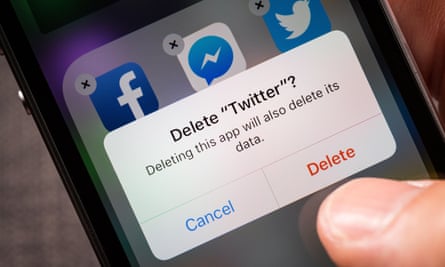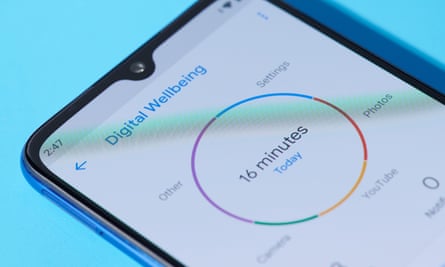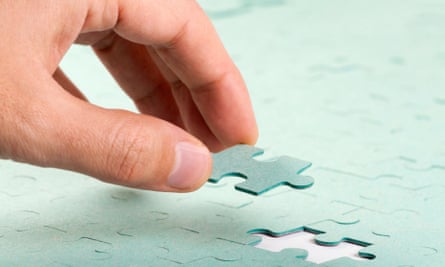‘I accidentally left my phone on Do Not Disturb – it was bliss!’
My work communications come primarily through three WhatsApp groups, so the blending of personal and work has felt pretty unavoidable. Then, I accidentally kept my phone on Do Not Disturb – ie. all notifications were silenced – for a week. It was bliss! As I still use my phone constantly, I picked up enough of the messages to show I’m still engaged in life and work, but since I don’t have the constant notifications I feel much calmer. It’s been months now and it’s been fine. Victory! Ammie Johnstone, Glasgow
‘I listen to podcasts while cleaning or knitting’
I can’t really cut down on screens at work, so I focus on doing so during my leisure time. Part of what makes TV or TikTok so appealing after a day of work is the convenience, so I try to have an engaging book ready or force myself to go on a walk before I let myself indulge. I find that podcasts are a particularly good substitute because they can scratch a lot of the same itches without using screens. I’ll listen to them while I’m cleaning or knitting. Ultimately, I think the best thing is having a convenient substitute ready and prepared by the time your willpower is burnt out. Callie, finance analyst, Chicago
‘I deleted my Twitter and Instagram accounts’

In the last four years, I came to realise how much of a cognitive and emotional toll social media was taking on me. I have a hyperactive mind so found it pleasing to scroll endlessly through Facebook, Instagram and Twitter. But this led to digital burnout during the pandemic – there was just so much to take in. What really broke me, though, was when social media became a hotspot for workplace conflicts as academics went on strike, flooding my digital space with negative perspectives about our sector. Trying to put strict limits on when and how I used Twitter never lasted more than a week or two. I uninstalled social media apps from my phone but eventually I realised I had to just leave. It helped that Elon Musk bought Twitter – I found an added political reason to go. And it helped that less and less Instagram content came from my actual friends – it became more like a string of adverts. So I deleted my accounts a year ago now. I don’t miss either and feel so much happier for it. I’ve started reading more magazines and printed newspapers, which keep me informed but in a much more controllable way. I haven’t felt digital burnout since. Fabien, lecturer, London
‘Leaving home without my phone feels almost mind-altering’
A very satisfying and almost mind-altering thing is to go out without a phone – it sounds weird, but it’s amazing! Agreeing on a time and place and just meeting someone there feels strange at first, but then a whole new world of being in the moment arises. Almost magical! You start to connect to people and places in a new way. Also, when I meditate and make music, it really helps to re-align the body and mind. I find it’s one of the most fun and simple ways to combat digital burnout. Vinnie Stergin, musician, artist and educator, Greenwich
READ RELATED: 37 Best Prime Day Deals to Shop Early in 2023
‘My friend and I compare weekly screen time reports’

I use the tools built into many phones to reduce screen time. My iPhone provides me with weekly reports on my screen time and the apps I’ve spent the most time using. I can compete with myself week on week, reducing how many times I pick up my device. My friend and I used to share our weekly reports and compare – perhaps more for comedic relief than anything. I also set limits – for example, I get a maximum of 30 minutes on social media each day, although I can request 15 more minutes to finish watching a video, for example. I have different limits on weekends with slightly longer allowances for certain news apps. I think measuring the time lost, spent, and pulled from us by app and content developers is a good step in the general direction of screen liberation. Rob, global opportunities officer, Keele
‘Years ago, I began to phase out screens at home’
I spend a good deal of my workday using a computer. I’ve altered the display settings to reduce eye strain, but at the end of a long day I am tired of screens. A few years ago, I began to phase out screens at home. I started with the TV. I sold it for cheap, just to get rid of it. Social media made me feel like a voyeur, mindlessly spying on casual acquaintances, so I deleted my accounts. I still found myself picking up my phone, so I sold it and replaced it with a minimalist one that only makes calls and texts. I replaced checking the news online with a subscription to the Guardian Weekly, and listening to the radio. I got rid of broadband and replaced it with a mobile hotspot on my dumbphone. It’s only 3Gb a month, but costs less than £10. It’s plenty. I can even download several podcasts to an MP3 player to get my audio fix. Some friends and family have been frustrated by my decisions but I find it’s led to more presence in face-to-face interactions. Everything feels so much more “real” now that I’m not living through a screen. I have more energy, and everything feels more intentional. I’d recommend it to everyone. Daniel, logistics coordinator, Merseyside
‘I don’t take my phone into the bedroom’
We have a dog which needs walking daily and I try not to look at my phone while walking him. I also have a morning routine which is screen-free, involving pilates, tai chi, and meditation practice. Unless my partner is out late with friends, I don’t take my phone into the bedroom and wind down before sleep with a book instead. After work, I try to go for a walk which I find helps the shift from work life to home life – something which can be tricky when you work from home. Otherwise, there’s an immediate shift from looking at a computer monitor to a TV which is not ideal. Anonymous, London
‘People buy me jigsaws for birthdays and Christmas’

I started buying jigsaw puzzles from charity shops. First, it was a Christmas puzzle as I thought that it would be a fun festive activity for the whole family. Then it snowballed, with family members buying me jigsaws for birthdays and Christmas, or just handing me bags of them from charity shops. I also enjoy building Lego as a nice change from all the jigsaws. The other thing I do is go for 30-minute walks. If I didn’t do these things, I’d be sat in the house watching YouTube videos, so at least they mean I’m not staring at a screen. Heather Johnson, retail worker, Newcastle




